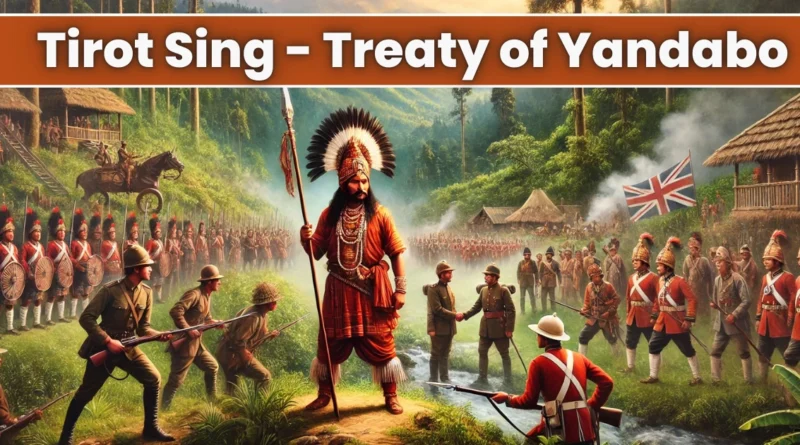Tirot Sing: Treaty of Yandabo
Tirot Sing was a respected Khasi chief and is remembered as one of India’s most important freedom fighters. He was the chief of Nongkhlaw, a region in the Khasi Hills of Meghalaya. Tirot Sing became a symbol of resistance against British colonial rule in the early 19th century. His leadership, bravery, and commitment to protecting his people from foreign control made him an iconic figure in Meghalaya’s history.
Table of Contents
Who was Tirot Sing?
Tirot Sing was born in 1802 into the Syiemlieh clan, a prominent Khasi clan. He became the Syiem or chief of Nongkhlaw. The Khasi people have a strong tradition of defending their sovereignty. Tirot Sing was a respected leader and was determined to protect his region from British control.
The British Threat and Tensions with the Colonial Powers
Treaty of Yandabu and British Expansion
In 1826, after the Treaty of Yandabu, the British East India Company gained control over the Brahmaputra Valley and the Surma Valley. Their goal was to connect these regions by constructing a road through the Khasi Hills. To do this, the British asked Tirot Sing for permission to build the road.
The British political agent, David Scott, promised Tirot Sing control over the duars (passes into Assam) and free trade if he allowed the road to be built. After consulting his durbar (council of elders), Tirot Sing agreed, thinking the road would help his people by opening new trade routes.
Betrayal and British Denial
The agreement quickly became problematic. The Raja of Ranee Balaram Singh challenged Tirot Sing’s claim to the duars. Tirot Sing expected the British to support his claim, but instead, they denied him control over the duars. This betrayal made Tirot Sing suspicious of British intentions.
Anglo-Khasi War and Guerrilla Resistance
On April 4, 1829, Tirot Sing and his forces attacked the British garrison in the Khasi Hills. The attack was successful, and two British officers were killed. Despite being outnumbered and lacking advanced weaponry, Tirot Sing’s forces fought bravely. The British retaliated, but the Khasi fighters used the dense forests and difficult terrain to their advantage, using guerrilla warfare tactics.
For four years, Tirot Sing and his warriors continued to fight using guerrilla tactics. They ambushed British forces, causing significant disruptions to British military operations. The British struggled to suppress the Khasi resistance because of the difficult terrain and the persistent attacks from the Khasi fighters.
Capture, Exile, and Death
In 1833, Tirot Sing was injured by a bullet and took refuge in the caves of the Khasi Hills. However, he was betrayed by one of his own men and captured by the British. After a trial, he was deported to Dhaka, in present-day Bangladesh, where he was imprisoned.
Tirot Sing spent the final years of his life in exile, far from his homeland. Despite his resistance to British colonialism, he passed away in captivity on July 17, 1835. His death marked the end of his active resistance, but his legacy as a freedom fighter inspired future generations.
Tirot Sing Day
Every year on July 17, the people of Meghalaya observe U Tirot Sing Day to honor his courage and sacrifices. His story is passed down through generations of Khasi people. Tirot Sing is remembered as a hero who fought to protect his land, culture, and people.
Tirot Sing’s resistance against colonialism made him a symbol of courage and defiance. His bravery continues to inspire people not only in Meghalaya but throughout India. He is remembered as a hero who stood up to foreign powers to protect his people’s rights and freedom.

